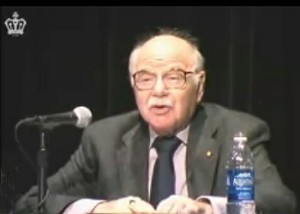A Closer Look at What Happened to Pat Buchanan, Part 1
Pat Buchanan has not appeared on MSNBC since October, when he began promoting his book, Suicide of a Superpower: Will America Survive to 2025? He expressed concern about “the end of white America” and the shrinking of the “European and Christian core of our country.” In January 2012 MSNBC’s president Phil Griffin said, “The ideas he put forth aren’t really appropriate for national dialogue, much less the dialogue on MSNBC.”
Following his dismissal from MSNBC, Buchanan named what he regards as the provocateurs of his downfall (see “The New Blacklist”). Buchanan blames “an incessant clamor from the left,” itemizing the Black-advocacy group Color of Change, Media Matters, and an unnamed LGBT group. After them, at the end of the list, Buchanan adds, “On Nov. 2, Abe Foxman of the Anti-Defamation League, who has sought to have me censored for 22 years, piled on.” Likewise Congressman Tom Tancredo: “MSNBC’s decision to dismiss Pat Buchanan shows the depths to which the mainstream media has caved to far-left pressure groups like the Southern Poverty Law Center, the National Council of La Raza, Color of Change and Media Matters. There can be no doubt that these smear operations were responsible for Buchanan’s dismissal.”
I disagree with this, the prevalent view. I argue that what many people think were the causes of Pat Buchanan’s dismissal probably were not. What really hurt Buchanan was probably not the horde of angry enemies circling the walls of MSNBC and blowing trumpets, not the ADL, not Media Matters, not even Color of Change or the LGBT group. While the public is disposed to equate making noise with exerting influence, the decision of an executive in an office need not have been influenced by any of that in the slightest. I suggest that the decision to fire Buchanan from MSNBC may have been based on a consideration that is relatively or even completely obscure to the general public. Read more





